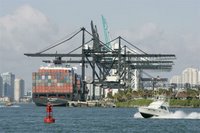Open World Under Attack
 Back to the snow after a few days in the nearly summer-like weather of Washington, although it will get somewhat cooler there as well in the next few days.
Back to the snow after a few days in the nearly summer-like weather of Washington, although it will get somewhat cooler there as well in the next few days.It was a Washington still in a state of semi-shock after the political stampede that forced Dubai-based DP World to withdraw part of the deal that would have given it ownership of a company running also some port operations in the United States.
It wasn't difficult to detect how embarrased persons like Vice President Cheney or Senator McCain was when the subject come up in conversations. All sought explanations in circumstances that were unique to the case - but all also seemed genuinely worried by the political trend it might represent.
And many were clear in their views on what had happened. New York Times columnist David Brook, whom I also met there, wrote about it in no uncertain terms:
"This Dubai port deal has unleashed a kind of collective mania we haven't seen in decades ... a xenophobia tsunami ... a nativist, isolationist mass hysteria. ... God must love Hamas and Muqtada al-Sadr. He has given them the America First brigades of Capitol Hill."
And his NYT colleauge Thomas Friedman wasn't less clear in his views.
This is "borderline racist. ... There's a poison loose. ... If we go Dark Ages, if we go down the road of pitchfork-wielding xenophobes, then the whole world will go Dark Ages."
Was it just anti-Arab? Was it anti-foreign in general? Does it show that protectionist sentiments are on the rise in the United States?
Well, my tentative answer would be that it was a bit of all of this - which certainly does not make things better.
The xenophobic reaction to the thought of any Arab coming close to the ports of the United States runs totally contrary to the fact that outside the US itself there are no facilities used as frequently by the US Navy as those of Dubai.
Someone said that the very newest aircraft carrier Ronald Reagan is on its way to the Dubai port. In addition, Dubai houses an airbase of critical importance to the US in the entire region. Dubai has been among the most loyal of allies to the United States for years.
More generally, it is highly disturbing that it is not understood that any "war on terrorism" can only be won by strengthening moderate Arab regimes and developing and broadening cooperation with them. It's by building alliance with the moderates and the modernisers of the Islamic world that the fundamentalists can be isolated and defeated.
But five years after 9/11, it seems as if the critically important distinction between anti-fundamentalists and anti-Arab is difficult to uphold even on Capitol Hill in the United States. It's certainly not a good sign for the future.
There was also a significant general anti-foreign element in the entire thing.
On the Hill there are now different pieces of legislation being prepared that would prevent foreign ownership of numerous things. It seems as if "foreign" is equal with dangereous" or even "hostile" - and that even for Senators with wide international experience like Hillary Clinton.
Add to this that with a trade deficit that is increasing by the minute there is bound to be an increase in protectionist sentiments and you get a breed that is deeply worrying for the future.
Late April will see thed visit to the United States of Chinese President Hu Jintao, and that is likely to lead to new discussions on these sensitie trade issues. A trade war between China and the United States, triggered by legislation on the Hill, is a distinct possibility if there is not a change in the present trends.
If the United States can not hold the ideals of an open world high - who will then be able to do it?
It's just a question so far. I hope it stays with that.


<< Home